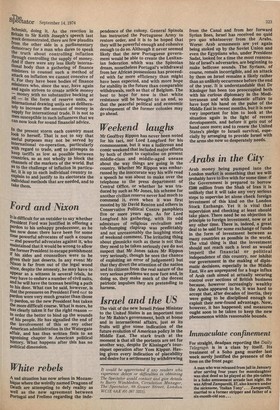Israel and the US
The visit of the new Israeli Prime Minister to the United States is an important test for Mr Rabin's government, both at home and in international affairs, just as its fruits will give some indication of the future evolution of American policy in the Middle East. The stark truth at the moment is that all the portents are set for another way, despite Dr Kissinger's tourniquet operation after Yom Kippur. Having given every indication of placability and desire for a settlement by withdrawing from the Canal and from her forward Syrian lines, Israel has received no quid pro quo whatsoever from the Arabs. Worse: Arab armaments are yet again being stoked up by the Soviet Union and even the Egyptians who, under President Sadat, looked for a time the most reasonable of Israel's adversaries, are beginning to make bellicose sounds. The Syrians, of course, remain incorrigible, and an attack by them on Israel remains a likely rather than an unlikely occurrence before the end of the year. It is understandable that Dr Kissinger has been too preoccupied both with his curious diplomacy in the Mediterranean and with domestic affairs to have kept his hand on the pulse of the Middle East in recent months, but it is now very important for him to look at the situation again in the light of recent developments, and before it gets out of hand once more; and to renew the United States's pledge to Israeli survival, especially by arranging to provide Israel with the arms she now so desperately needs.


































































 Previous page
Previous page